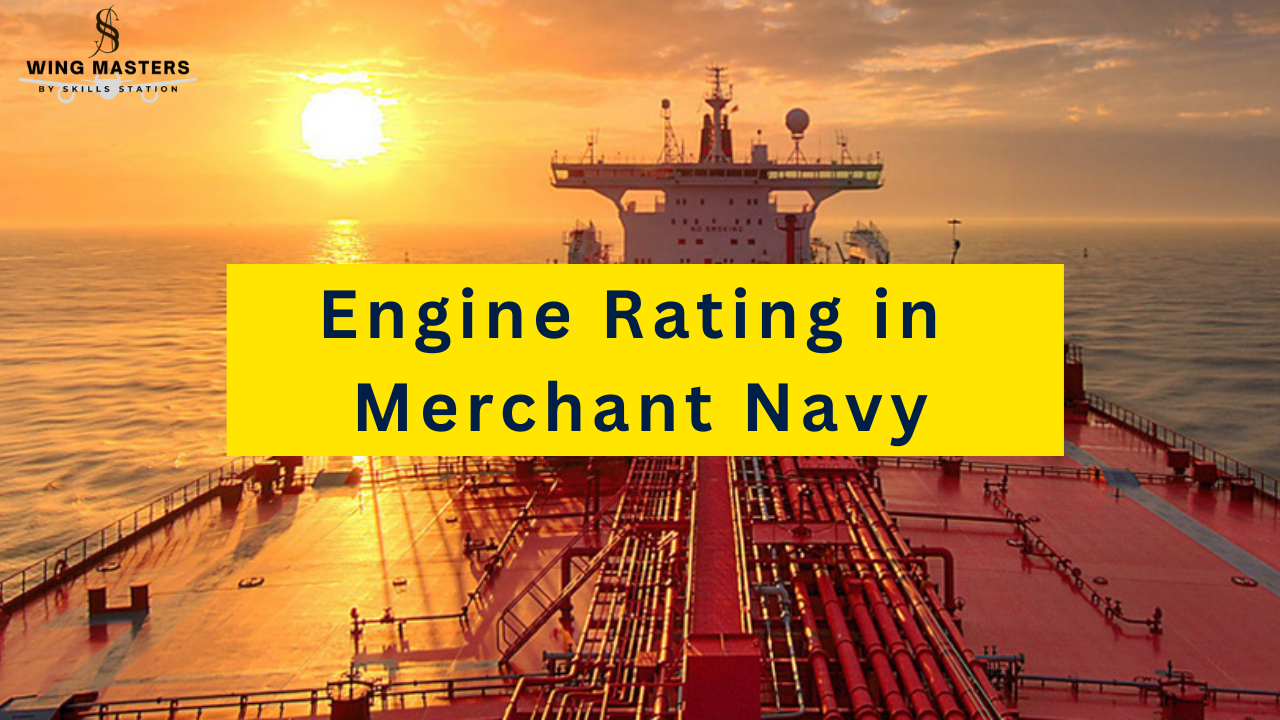
Engine rating in merchant navy is an essential entry-level position in the engine department of a ship. These professionals assist marine engineers in operating and maintaining mechanical systems. This role serves as an ideal pathway for candidates seeking to start a career at sea without an engineering degree.
At SkillsStation, we guide aspiring mariners with verified insights, eligibility details, and training routes to make informed decisions. Our resources aim to simplify your entry into the merchant navy with confidence and clarity.
What Does the Engine Rating Role Involve?
The engine rating in merchant navy refers to seafarers working under the supervision of engineers, handling tasks like machine cleaning, oiling, and basic engine room maintenance. Their job is to ensure that the ship’s machinery is functioning efficiently throughout the voyage.
These ratings are vital to the ship’s operations and often begin their journey through short-term, approved training programs after completing 10th or 12th grade.
Entry Criteria and Medical Requirements
Anyone interested in becoming an engine rating in merchant navy must meet the following conditions:
Academic Requirements: Minimum 10th pass with 40% overall and 40% in English (10th or 12th)
Age Limit: 17.5 to 25 years
Medical Fitness:
No color blindness
6/6 eyesight in both eyes (unaided)
Physically fit as per DG Shipping medical standards
These are part of the broader Merchant Navy Eligibility Criteria and must be fulfilled before applying for any maritime course.
Training and Certification
Becoming an engine rating in merchant navy requires completion of a DG Shipping-approved pre-sea training course. This program is generally six months long and includes both classroom and practical engine room sessions.
Key Elements of the Training:
Marine engine basics
Fuel and lubrication systems
Firefighting techniques
Shipboard discipline and safety
Emergency drills and STCW modules
On completing the training, students receive STCW certificates and a CDC (Continuous Discharge Certificate), which are required for legal placement on ships.
Steps to Begin Your Career at Sea
Wondering how to join merchant navy as an engine rating? Here’s a simple process:
Meet Eligibility Requirements
Choose a DG Shipping-Approved Institute
Pass Medical Examination
Enroll in Engine Rating Course
Get Certified (CDC + STCW)
Apply for Onboard Placement
This route provides a solid, technical foundation and is often quicker and more affordable than officer-level courses.

Work Responsibilities Onboard
Once placed on a vessel, an engine rating in merchant navy is expected to handle the following responsibilities:
Routine maintenance of ship engines and parts
Assisting engineers with overhauls
Cleaning engine room machinery
Conducting safety checks
Working in hot, confined engine rooms for long hours
Following international maritime safety standards
Engine ratings often work in shifts and are part of an organized watchkeeping system, ensuring 24/7 engine room monitoring.
Growth and Promotion Path
Starting as an engine rating in merchant navy opens doors to higher posts with time and dedication. Seafarers can eventually be promoted to:
Oiler
Fitter
Pumpman (on tankers)
Junior Engineer
Marine Engineer (with further certification)
To progress, additional short courses, sea-time experience, and examinations are required, but the effort leads to greater responsibility and a better salary.
Career Benefits and Challenges
Before enrolling, it’s important to evaluate the Merchant Navy’s Advantages and Disadvantages.
Advantages:
Global travel and multicultural work environment
Early career start and income
High salary potential in the long term
Free food, lodging, and tax exemptions (for NRIs)
Disadvantages:
Extended periods away from home
Physically and mentally demanding work
Limited job security without continuous upgrading
Health risks due to environment and machinery
Being well-informed helps in making a balanced career decision.
Expected Earnings for Engine Ratings
Salaries for an engine rating in merchant navy vary by vessel type, experience, and company. Here’s an estimated pay range:
| Role | Average Monthly Salary (INR) |
|---|---|
| Engine Rating | ₹20,000 – ₹40,000 |
| Oiler | ₹40,000 – ₹60,000 |
| Fitter | ₹50,000 – ₹75,000 |
| Junior Engineer | ₹70,000 – ₹1,20,000 |
Some companies also offer rejoining bonuses, onboard perks, and international insurance benefits.
Tips to Prepare for Maritime Interviews
Even those applying for engine rating in merchant navy roles may need to attend personal interviews or initial screening sessions. These interviews assess your readiness to work in a technical, physically demanding maritime environment.
Here are some Interview Tips for the Merchant Navy:
Be confident in your basic mechanical knowledge, especially in areas related to ship machinery and maintenance
Maintain good posture and strong body language to convey discipline and awareness
Answer questions honestly about your interest in working at sea and why you chose the engine rating in merchant navy path
Be familiar with marine safety rules, STCW protocols, and emergency procedures
Keep your medical fitness certificate ready, as physical eligibility is critical

Conclusion
Choosing to start as an engine rating in merchant navy can be a smart move for students wanting to enter the maritime industry quickly. It offers early exposure, technical growth, and an eventual path to senior roles through continuous learning. With guidance from SkillsStation and professional training from the best navy academy in Dehradun, your journey toward a successful marine career can begin with confidence.
FAQs About Engine Rating in Merchant Navy
Q1. Can I become an engine rating after the 10th class?
Yes, a 10th pass with 40% marks and 40% in English is the minimum qualification.
Q2. Is experience required before joining the course?
No, prior experience is not needed. The pre-sea course will train you from scratch.
Q3. How long does it take to get a job after the course?
Many institutes offer placements within 3–6 months after certification.
Q4. Is engine rating a permanent job?
Initially, contracts are temporary but can be extended or renewed based on performance.
Q5. Can I become a marine engineer from engine rating?
Yes, with enough sea time and additional courses, you can be promoted over time.
Q6. Do I need to pass IMU CET for engine rating?
No, IMU CET is not mandatory for engine rating roles. Admission is generally direct through private institutes.

Pingback: Powerful Insights on Merchant Navy Salary After the 10th - Skills Station